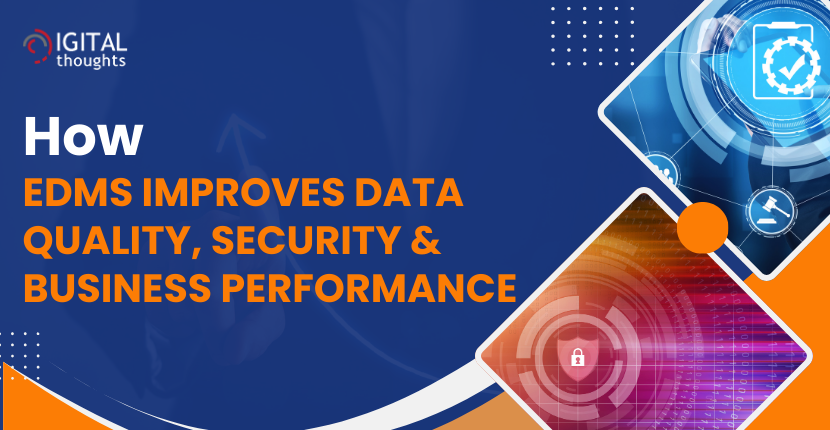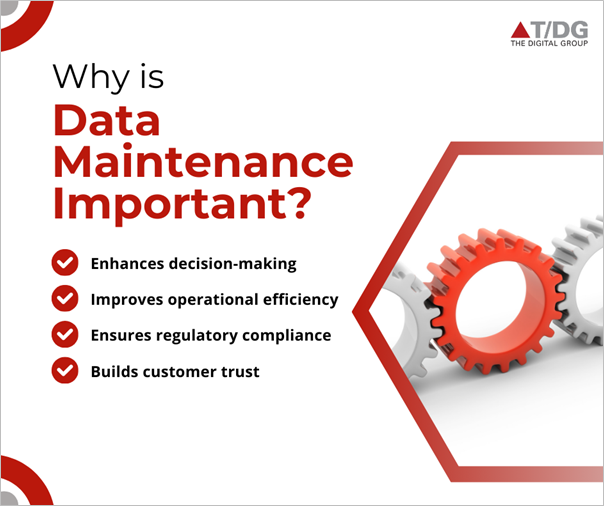Enterprise Data Maintenance Solutions: The Key to Data Accuracy & Security

Enterprise Data Maintenance Solutions are an in-depth set of processes, tools, and technologies that ensure an organization's data is correct, consistent, safe, and easily available. Nowadays, since companies rely extensively on data for decision-making, operations, and customer interactions, Enterprise Data Maintenance Solutions serves as the core of modern business operations. Proper data maintenance allows companies to maximize the value of their data assets while reducing the risks associated with data errors or breaches. These solutions ensure that the data being utilized is trustworthy, easily accessible, and protected from loss or unauthorized access.
Data Governance is an essential part of Enterprise Data Maintenance Solutions, as it creates the policies and procedures that regulate how data is maintained throughout its lifecycle. This ensures that all stakeholders engaged with the data have clear roles, responsibilities, and accountability.
Data Quality Management focuses on keeping accurate, full, and reliable data, allowing organizations to make educated decisions without the danger of depending on incorrect information. Another vital component is Master Data Management, which centralizes important data assets like as customer, product, and vendor information. By unifying and standardizing key data, Master Data Management removes redundancies and promotes uniformity throughout the enterprise.
Data Security and Compliance is an important part of Enterprise Data Maintenance Solutions since it protects sensitive information from unauthorized access and ensures conformity to regulatory requirements like as GDPR, HIPAA, and CCPA. This enables firms to reduce legal and reputational risks while maintaining customer trust. Data Integration also plays an important role in integrating multiple systems and applications, allowing for seamless data sharing and cooperation across departments.
This integration allows decision-makers a comprehensive perspective of the organization's data ecosystem. Finally, Data Archiving and Backup guarantees that historical data is efficiently saved and accessible for future reference, audits, or compliance requirements, all while protecting against data loss. By combining these components, Enterprise Data Maintenance Solutions provides enterprises with a solid framework for realizing the full value of their data, increasing productivity, and maintaining a competitive advantage.
Understanding the Basics of Enterprise Data
Data is the fundamental component of modern businesses, reflecting raw facts and data gathered from many sources. These facts can include anything from customer data and sales figures to website traffic and social media engagement.
Data is usually divided into two types: structured data and unstructured data. Structured data is well-organized and kept in databases, making it easy to access and analyze. Customer records, inventory lists, and transaction details are some examples. Unstructured data, on the other hand, has no predefined format and can include emails, videos, photos, and social media posts, necessitating the use of specialist tools to process and analyze. Both types of data are extremely valuable, but proper management is vital to an enterprise's success.

Data maintenance is critical because it assures the correctness, consistency, and dependability of the data that businesses rely on. Clean and well-maintained data improves decision-making by giving management with reliable insights that allow them to create effective plans. It also improves productivity by minimizing redundancies, optimizing processes, and assuring seamless communication across systems.
Furthermore, data maintenance is essential for regulatory compliance, assisting companies in fulfilling legal deadlines and avoiding penalties related to data breaches or neglect. At last, well-managed data fosters consumer trust by ensuring privacy, security, and customized services, all of which are critical to maintaining a loyal customer base.
Master Data Management (MDM)
A key component of enterprise data maintenance is master data management (MDM), which is meant to provide a single source of truth for vital information entities like clients, goods, suppliers, and more. Data silos, which frequently occur when departments keep their own, distinct versions of data, are removed by centralizing these crucial data assets. Inconsistencies, inefficiencies, and a fragmented consider of the organization's data might result from these silos.
Better collaboration, more efficient operations, and better informed decision-making are made feasible by Master Data Management, which ensures that all departments within an organization are working with the same, consistent, and correct data. Master Data Management's ultimate objective is to produce unified, trustworthy data that forms the foundation of reporting, analytics, and operational procedures.
Data modelling, which includes graphically illustrating the organization's data architecture, is one of the essential of Master Data Management. This makes it simpler to identify gaps or redundancies in data by offering a clear blueprint for how it is related, stored, and structured. Another important component is data harmonization, which focuses on addressing discrepancies across various datasets. For example, separate systems may record a customer's name or address differently; harmonization reconciles the differences to create uniformity.
The Golden Record, which stands for the only, most complete, and exact version of a data entity, is the basis of Master Data Management. For example, a customer's Golden Record would compile all pertinent and validated data on them from multiple systems into a single, reliable source. By combining these elements, Master Data Management helps businesses function more effectively and make better strategic choices in addition to improving data quality.
Data Quality Management
Data Quality Dimensions
- Accuracy: Is the data correct?
- Completeness: Are all necessary fields filled?
- Consistency: Does data match across systems?
- Timeliness: Is the data up-to-date?
Data Security and Compliance
Key Concepts
- Data Encryption: Securing data during transmission and at rest.
- Role-Based Access Control (RBAC): Restricting data access based on roles.
- Compliance Standards:
- GDPR (General Data Protection Regulation)
- HIPAA (Health Insurance Portability and Accountability Act)
- CCPA (California Consumer Privacy Act)
Data Archiving and Backup
Importance
- Frees up storage for operational systems.
- Ensures compliance with data retention laws.
Techniques
- Cold Storage: Storing infrequently accessed data.
- Snapshot Backups: Taking regular snapshots of data to recover from failures.
Common Mistakes in Enterprise Data Maintenance Solutions
Avoiding frequent mistakes in Enterprise Data Maintenance Solutions is essential to ensuring the dependability and efficacy of data systems. Ignoring data governance—which includes unclear standards and responsibilities for data management—is one of the worst mistakes. Organizations frequently deal with inconsistent and untrustworthy data in the absence of a strong data governance structure, which can cause misunderstandings, inefficiencies, and a decline in confidence in the data used to make decisions.
Neglecting data quality is another frequent error that occurs when businesses ignore problems like errors, missing fields, or duplicate entries. Decision-making can be severely hampered by this "dirty data" since leaders may make costly mistakes if they base their strategy on inaccurate or insufficient information.
Furthermore, data silos—where information is segregated within particular systems or departments—can result from underestimating integration demands. This lack of connection makes it difficult to collaborate and share data easily, which reduces operational effectiveness and the capacity to obtain thorough insights throughout the company. Last but not least, neglecting data security is a serious mistake that leaves the company vulnerable to cyberattacks, data breaches, and noncompliance with regulations.
In addition to endangering sensitive data, ignoring procedures like encryption, role-based access restrictions, and routine audits can result in financial penalties and harm to the organization's reputation. Businesses can make sure their Enterprise Data Maintenance Solutions provides the most value by fixing these errors and putting strong governance, quality management, integration, and security procedures in place.
Conclusion
The Digital Group (T/DG) offers comprehensive Enterprise Data Maintenance Services designed to help organizations keep their data accurate, up-to-date, and relevant in today's dynamic market environment. These services are crucial for businesses aiming to maintain high data quality, which in turn supports effective decision-making and operational efficiency.
In addition to governance, T/DG emphasizes data quality management. This involves processes such as data standardization, cleansing, de-duplication, and enrichment to ensure that the data is accurate, complete, and reliable. By addressing issues like missing or duplicate data, T/DG enables organizations to trust their data for critical business decisions.
T/DG also offers data integration services, connecting various systems within an organization to enable seamless data sharing and eliminate silos. This integration ensures that all departments have access to consistent and up-to-date information, fostering better collaboration and efficiency.
Furthermore, T/DG provides data security and compliance services to protect sensitive information and ensure adherence to relevant regulations. By implementing robust security measures and conducting regular audits, T/DG helps organizations safeguard their data against breaches and maintain customer trust.
The Digital Group's Enterprise Data Maintenance Services offer a holistic approach to managing organizational data. By focusing on data governance, quality management, integration, and security, T/DG ensures that enterprises can rely on their data for informed decision-making and sustained success.
